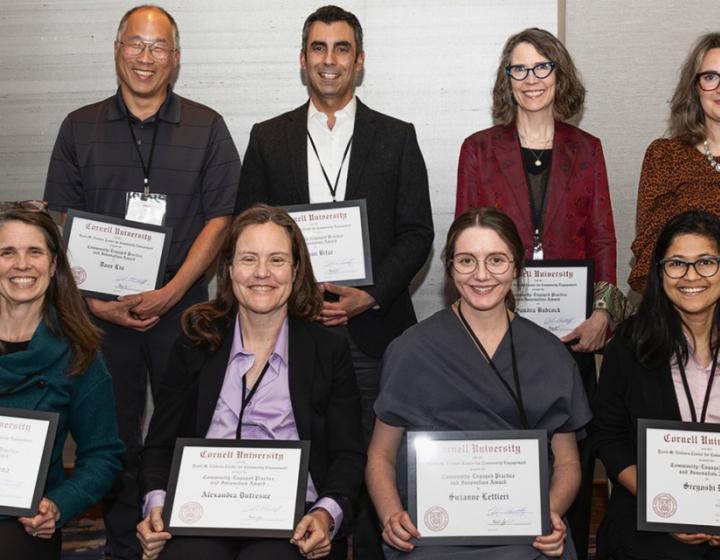Cornell animal hospital comes through for Bentley
This story was written by Harold Miller and originally appeared in The Auburn Citizen.

My love of dogs has filtered deep into the Miller clan. Most of my children have had dogs and most of my grandchildren have one or two dogs. Five years ago, son Chris traveled to State College, Pennsylvania, to get a relatively rare British cream golden retriever. We have enjoyed Bentley almost every weekend during summers at our lake house. He loves to run at top speed on our long dock and plunge into the water for a swim.
Several weeks ago, Bentley ran at top speed to attack a high-speed stand-up mower that was doing Chris’s lawn at his house in Syracuse. Bentley misjudged his speed and slid under the blades, which cut off a paw and part of his tail, and mangled a rear leg. Immediately, my son loaded the badly injured animal into his SUV and brought him to their local veterinarian. The doctor advised Chris to put the dog down, but if there was any chance to save him, only Cornell University's College of Veterinary Medicine and Companion Animal Hospital in Ithaca could do it. At that point, my son drove to Cornell. During the trip, his kids were all texting him and begging him not to put Bentley down. When Chris arrived at the hospital, the technicians brought Bentley to their emergency triage area, where his health and stability was first assessed. Once he was treated for shock related to his injuries, he was placed under general anesthesia for further assessment and cleaning of his wounds.
After four hours of intense examination and treatment (during which time Chris was pacing back and forth outside the hospital), it was determined that they could preserve his mobility and quality of life. However, it would not be easy, and many weeks of treatment at the hospital and at home would be necessary.

Bentley spent three weeks in the hospital, much of the time immobile while a vacuum-assisted closure was used to help granulation of deep tissue in order to heal the tissue faster. Also, the bones in his injured hind leg had to be pinned together. Luckily, the mangled hind leg was opposite his torn-off front paw so that, after a prosthesis was fashioned for the front leg and the hind leg was operated on and stabilized, the dog should be able to walk and run almost normally. The doctor told me that the most difficult part of his rehabilitation lie ahead after Bentley was discharged. Only the dedicated discipline of Chris’s family allowed the dog to completely recover. A Help 'Em Up harness was used so that Bentley could be carried outside for his daily toilet needs.
Of course, this miracle could not have been accomplished without the incredible ability of the Cornell University College of Veterinary Medicine and Companion Animal Hospital and the love and caring of the hospital staff, plus Chris’s entire family.
After many months of treatment and healing, I can happily report that, once again, Bentley can run on our dock at high speed and plunge into the water for a swim.
Cornell University’s College of Veterinary Medicine and Companion Animal Hospital is one of the leading institutions of its kind in America. More than 22,000 dogs, cats and other small mammals receive health and medical care each year.
Routine health care, including physical examinations, vaccinations and treatment of minor illnesses, is provided at their extensive facilities. Veterinary students in the third and fourth year of their Doctor of Veterinary Medicine program, assisted by veterinary technicians, treat animals during scheduled appointments.
The student clinicians are supervised by faculty veterinarians, who consult and provide medical assistance for each case as needed. Additionally, many animal patients at the Companion Animal Hospital are referred by their veterinarians for evaluations by faculty specialists for complicated medical or surgical problems.
Recently, I met with Dr. Janice Lapsley, who directed the entire procedure, in order to review the operation and rehabilitation of Bentley. She told me that very few prostheses have ever been done at the hospital because very few dogs have the gentle and patient personality that Bentley has. They could not treat and confine an aggressive animal as they did to this gentle dog. It was amazing to hear that during the first few days of Bentley’s confinement in a crate, technicians slept with him overnight until he adjusted to his surroundings.
Today, Bentley can run, jump and swim and play as any dog can — but I doubt that he will chase lawnmowers any more. Today, Bentley has a special meaning in the life of Chris and his family. The investment made to save his life and preserve his health has already paid considerable dividends. Our entire family is indebted to the staff of Cornell University’s College of Veterinary Medicine and Companion Animal Hospital (vet.cornell.edu) They are unique in their field — not only for their technical skills, but for their love of the animals they treat.
Harold Miller is a businessman and Auburn native. He can be reached at hmiller@mcsmms.com.




